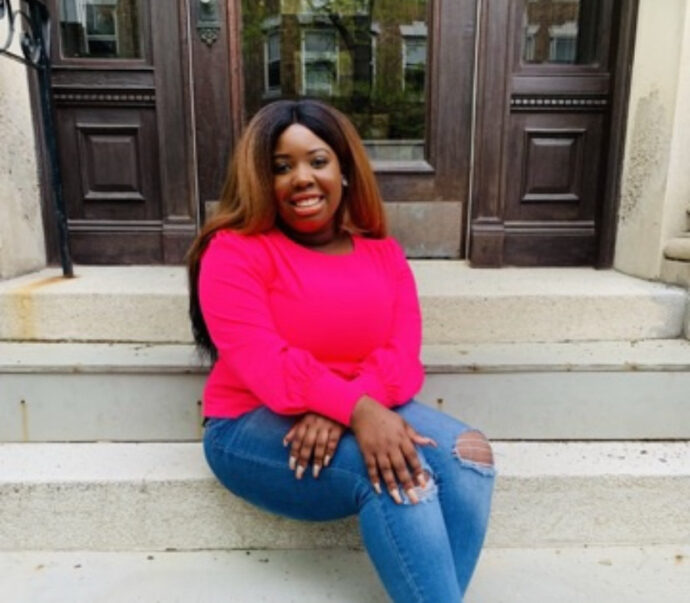Alexandria Whitted, MPH (c) Spotlight on Global Health Excellence
Tell us about yourself.
My name is Alexandria Whitted, and I am from Chadbourn, North Carolina. I am a passionate and charismatic young woman pursuing a Master of Public Health degree in Global Health Program Design, Monitoring, and Evaluation with an additional certificate in Sex, Sexuality, and Gender. In 2020, amid the COVID-19 pandemic, I became a first-generation college graduate from East Carolina University with Bachelors degrees in Public Health: Community Health and African and African American Studies. Most notably, in 2016, I was among the final cohort of Gates Millennium Scholars and I am an inaugural research fellow for the Boston University’s Center for Antiracism.
What are your dreams and goals after school?
I have multiple career goals because success is not linear but I want to be an exceptional scholar and exponential change maker. Dreams after completing my masters include taking the time to complete and publish my own figments of my imagination. In addition , I would love to open up my own franchise of wellness centers for low income communities. My career goals include becoming an international developer who utilizes feminist technology to advance the lives of women and girls globally. My next career aspiration is to develop culturally and generationally relevant programs through career consulting about sexual/reproductive health, antiracism, and women’s empowerment. My last goal would be to become a distinguished professor so that I could share my knowledge and help change the narrative of what a world renowned academic is.
Why did you pick this topic?
I picked this topic because I like sex, not everything about it though. On my journey into becoming the woman I am today I have witnessed and experienced sexual harassment. Come to dislike the negative portrayals and the suppression of Black women’s sexuality while experiencing the public scrutiny of Black women being oversexualized for simply just existing. Another reason I picked this topic is because I took classes where I was constantly reminded that Black women lead in all these negative sexual/maternal health outcomes and I only heard the answer of why from white professors. I was tired of that. I desired to research my own community and assess from my perspective as a Black qualitative researcher. Lastly, I am enjoying my journey and witnessing other young Black women discover our own sensuality that has nothing to do with anyone else or how we sexually identify. This era of self discovery for us has sparked an interest in going into the past to learn more by drawing my own conclusions to offer this same reclamation and liberation to older generations of Black women.
Do you plan to specialize in sexual health? Why / Why Not?
Absolutely! My master plan to specialize in sexual health is currently being developed with an interdisciplinary approach. It will address the historical damage done and promote new solutions in sexual & reproductive health understanding globally. More specifically, I have began a journey into utilizing feminist technology as a medium to provide culturally and generationally component information for black and brown adolescents. Another component of my master plan is to develop low to no cost programs educating on various topics such as sexual grooming, how to not sexualize children, understanding consent, ways that sex is transactional and sex education tailored to sexual minorities. I am optimistic about opening my own franchise of wellness centers dedicated to my goals for promoting sexual and reproductive health.
What is the number 1 thing that black women / families should know & do? Why?
The one thing that I believe that black families specifically mothers should know and stop doing is over sexualizing our children. To keep this response brief, sexualizing children establishes unhealthy norms that sometimes take years and professional help to manage. Yes, manage is the word I would like to use because no one is achieving all 8 dimensions of wellness 100% of the time. From my own analysis, sexualizing children, specifically Black ones does not promote bodily autonomy, and slowly distorts the image we have of ourselves for future relationships. Sexualizing also blurs the lines of consent and what a child can deem morally right from wrong. I say this because the majority of individuals who are sexually assaulted know their abuser, in the case of children, the “good touch bad touch” conversation is oftentimes not explicit enough to include family members. We are taught that we can trust family but in Black families sexual abuse/violence is an unspoken rule and sometimes children are so young they do not even know what is happening to them is wrong but this topic fuels me because it is personal to me. Then there are the accusations that a female child is sexually active based on the way her body is developing during puberty become extremely harmful and toxic to their physical and emotional development. Adults’ insinuations of what adolescent children are doing sexually based on their body types creates catastrophic health outcomes, of all of them I believe open a gateway for sexual grooming before we recognize it as such. Again, to be brief I believe that children should not be sexualized but instead properly educated about the effects of everything from consent to sexual harassment spiritually, mentally, and physically. But first, promoting this conversation has to be understood by parents themselves because they also need to understand their role in promoting healthy sexual autonomy which changes (really initiates) the conversation for future generations of Black children.
To connect with Alexandria Whitted, MPH (c) on LinkedIn, visit https://www.linkedin.com/in/alexandriawhitted/
